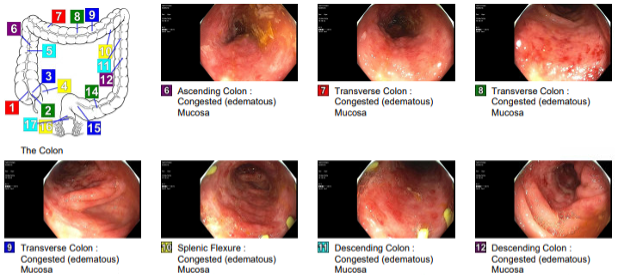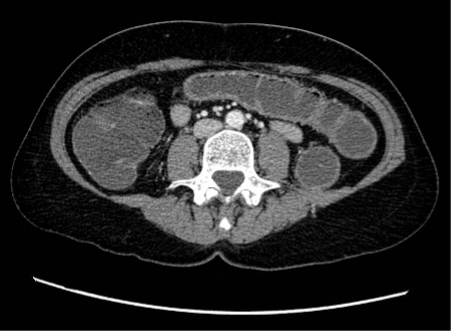Monday Poster Session
Category: Infections and Microbiome
P3459 - Dengue Colitis: An Unwanted Souvenir From a Vacation to the Tropics
Monday, October 27, 2025
10:30 AM - 4:00 PM PDT
Location: Exhibit Hall

Yash V. Bhagat, MD (he/him/his)
NewYork-Presbyterian / Brooklyn Methodist Hospital
Brooklyn, NY
Presenting Author(s)
Yash Bhagat, MD, Alvin Oommen, MD, Saamia Faruqui, MD
NewYork-Presbyterian / Brooklyn Methodist Hospital, Brooklyn, NY
Introduction: Dengue fever, a vector borne disease of the tropics, has an estimated global burden of 50 million infections per year. While dengue hemorrhagic fever is accompanied by thrombocytopenia, liver injury, hemorrhage, plasma leakage and recurrent fevers that require a higher level of medical care, dengue fever has subtler manifestations and is managed supportively. Upper gastrointestinal (GI) bleeds are commonplace in dengue; however, lower GI manifestations of dengue often go undiagnosed with minimal symptoms. We present a case of a middle aged female with acute colitis, an uncommon manifestation of her dengue fever.
Case Description/
Methods: A 62 year old female with pertinent travel history to Costa Rica presented with 5 days of cramping abdominal pain, constipation, and non-bloody non-bilious vomitus accompanied with fevers and chills. Computed tomography of her abdomen and pelvis revealed a moderate to large volume of stool throughout the colon most notably distending the cecum with minimal pericolonic inflammatory stranding in the transverse and descending colon. Although leukocytosis and constipation resolved with empiric antibiotic treatment and bowel regimen, the patient was found to have fevers of up to 38.20C, thrombocytopenia (101 x 103 count/uL), and elevated liver function tests (AST of 110 U/L and ALT of 116 U/L), CRP (162 mg/L) and fecal calprotectin ( >3,000 ug/g). Infectious blood and stool workup initially found dengue IgM (1.02) and IgG (0.10) antibodies to be negative. However, on repeated testing the patient was found to have negative IgM (0.93) but positive IgG dengue antibodies (1.20) likely representing a cleared infection. Moreover, biopsy of the descending colon on colonoscopy demonstrated ischemic colitis with focal fibrosis further supporting the diagnosis of a dengue-related insult to the colon.
Discussion: While the upper GI tract is commonly affected in dengue fever, involvement of the colon is rare. Although the mechanism of ischemic colitis seen in the presence of dengue fever is not elucidated, the involvement of dengue in microvascular and coagulopathic changes is thought to be the likely mechanism. Further studies on the difference between upper and lower GI insults in dengue and the physiologic mechanisms leveraged by dengue to cause dengue fever and hemorrhagic fever are necessary to understand how to best support patients as they recover from the illness.

Figure: Figure 1: CT abdomen and pelvis with intravenous contrast demonstrating minimal pericolonic inflammatory stranding in the transverse colon.

Figure: Figure 2: View of the congested and edematous mucosa of the transverse and descending colon that was biopsied on colonoscopy.
Disclosures:
Yash Bhagat indicated no relevant financial relationships.
Alvin Oommen indicated no relevant financial relationships.
Saamia Faruqui indicated no relevant financial relationships.
Yash Bhagat, MD, Alvin Oommen, MD, Saamia Faruqui, MD. P3459 - Dengue Colitis: An Unwanted Souvenir From a Vacation to the Tropics, ACG 2025 Annual Scientific Meeting Abstracts. Phoenix, AZ: American College of Gastroenterology.
NewYork-Presbyterian / Brooklyn Methodist Hospital, Brooklyn, NY
Introduction: Dengue fever, a vector borne disease of the tropics, has an estimated global burden of 50 million infections per year. While dengue hemorrhagic fever is accompanied by thrombocytopenia, liver injury, hemorrhage, plasma leakage and recurrent fevers that require a higher level of medical care, dengue fever has subtler manifestations and is managed supportively. Upper gastrointestinal (GI) bleeds are commonplace in dengue; however, lower GI manifestations of dengue often go undiagnosed with minimal symptoms. We present a case of a middle aged female with acute colitis, an uncommon manifestation of her dengue fever.
Case Description/
Methods: A 62 year old female with pertinent travel history to Costa Rica presented with 5 days of cramping abdominal pain, constipation, and non-bloody non-bilious vomitus accompanied with fevers and chills. Computed tomography of her abdomen and pelvis revealed a moderate to large volume of stool throughout the colon most notably distending the cecum with minimal pericolonic inflammatory stranding in the transverse and descending colon. Although leukocytosis and constipation resolved with empiric antibiotic treatment and bowel regimen, the patient was found to have fevers of up to 38.20C, thrombocytopenia (101 x 103 count/uL), and elevated liver function tests (AST of 110 U/L and ALT of 116 U/L), CRP (162 mg/L) and fecal calprotectin ( >3,000 ug/g). Infectious blood and stool workup initially found dengue IgM (1.02) and IgG (0.10) antibodies to be negative. However, on repeated testing the patient was found to have negative IgM (0.93) but positive IgG dengue antibodies (1.20) likely representing a cleared infection. Moreover, biopsy of the descending colon on colonoscopy demonstrated ischemic colitis with focal fibrosis further supporting the diagnosis of a dengue-related insult to the colon.
Discussion: While the upper GI tract is commonly affected in dengue fever, involvement of the colon is rare. Although the mechanism of ischemic colitis seen in the presence of dengue fever is not elucidated, the involvement of dengue in microvascular and coagulopathic changes is thought to be the likely mechanism. Further studies on the difference between upper and lower GI insults in dengue and the physiologic mechanisms leveraged by dengue to cause dengue fever and hemorrhagic fever are necessary to understand how to best support patients as they recover from the illness.

Figure: Figure 1: CT abdomen and pelvis with intravenous contrast demonstrating minimal pericolonic inflammatory stranding in the transverse colon.

Figure: Figure 2: View of the congested and edematous mucosa of the transverse and descending colon that was biopsied on colonoscopy.
Disclosures:
Yash Bhagat indicated no relevant financial relationships.
Alvin Oommen indicated no relevant financial relationships.
Saamia Faruqui indicated no relevant financial relationships.
Yash Bhagat, MD, Alvin Oommen, MD, Saamia Faruqui, MD. P3459 - Dengue Colitis: An Unwanted Souvenir From a Vacation to the Tropics, ACG 2025 Annual Scientific Meeting Abstracts. Phoenix, AZ: American College of Gastroenterology.
